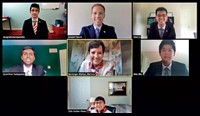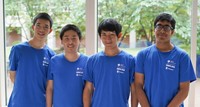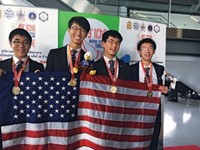Advertisement
Grab your lab coat. Let's get started
Welcome!
Welcome!
Create an account below to get 6 C&EN articles per month, receive newsletters and more - all free.
It seems this is your first time logging in online. Please enter the following information to continue.
As an ACS member you automatically get access to this site. All we need is few more details to create your reading experience.
Not you? Sign in with a different account.
Not you? Sign in with a different account.
ERROR 1
ERROR 1
ERROR 2
ERROR 2
ERROR 2
ERROR 2
ERROR 2
Password and Confirm password must match.
If you have an ACS member number, please enter it here so we can link this account to your membership. (optional)
ERROR 2
ACS values your privacy. By submitting your information, you are gaining access to C&EN and subscribing to our weekly newsletter. We use the information you provide to make your reading experience better, and we will never sell your data to third party members.
Biotechnology
Korea and Russia top 51st International Chemistry Olympiad
US earns three gold and one silver at the annual high school chemistry competition
by Alexandra Taylor
July 30, 2019

The US team won three gold medals and one silver medal at the International Chemistry Olympiad, held in Paris this year from July 21 through July 30. Korea and Russia tied for most gold medals with four each. Liu He, a student on the Chinese team, won the top-scoring gold medal.
The US team, which is sponsored by the American Chemical Society, was made up of Edward Jin, a graduate of Arnold O. Beckman High School; Albert Liu, a graduate of North Hollywood High School; Anton Ni, a graduate of University High School; and Yajvan Ravan of Churchill High School.
Ravan, Ni, and Jin placed 19th, 28th, and 30th in the gold medal category, respectively, and Liu placed 22nd in the silver medal category. Competition organizers awarded a total of 37 gold medals, 64 silver medals, and 74 bronze medals to a group of more than 300 high school students representing 80 countries. Each country may send up to four students to the competition.
Patrick Chan, a chemistry teacher at Benjamin N. Cardozo High School; Melissa Barranger Mathys of Ursuline College; Tomislav Pintauer of Duquesne University; and Derek Wang, an incoming PhD candidate at Harvard University, mentored the students. Though he had hoped for four golds, Chan was proud of the team’s performance in several areas of the practical exam, including on one problem involving organic synthesis. “All of them got perfect scores on that part,” he says.
In homage to the competition’s host country, another question on the practical exam involved a multistep titration to determine the concentration of an iron(III) compound in wine (Iron can cause wine to spoil).
The US team showed off their problem-solving skills on the theoretical exam—the section on polymer chemistry in particular. Because the section was new, the team had devoted a lot of time to it during preparation; Chan says they all did “phenomenally.”
On preparing for the competition, Ni says, “I did problems from various Olympiads and read textbooks, and our local ACS section was kind enough to arrange a lab for me to practice at.”
The practical and theoretical exams lasted 5h under less-than-ideal conditions. The day of the practical exam, temperatures in Paris exceeded 100 °F. “It’s been quite difficult handling the heat,” Liu says.
When they weren’t competing, the students mingled with teams from other countries. “Even though we all have different languages, different cultures, we can still all bond over chemistry,” Jin says.
They also had the opportunity to visit some of the area’s most iconic sites, including the Eiffel Tower and the Palace of Versailles. “I was impressed by how big and luxurious [Versailles] was,” Ravan says. “I was totally blown away by it.”
Chan says the teammates enjoyed their share of French food. Ni especially appreciated the opportunity to snack on world-class croissants.
Mathys and Joseph Houck of Pennsylvania State University accompanied the students during their trip.
Jin, Liu, and Ni will all start college at Massachusetts Institute of Technology this fall, and Ravan will be a high school junior. “I’m so impressed by them,” Chan says.
CLARIFICATION
This story was updated Aug. 5, 2019, to include all of the students’ mentors.





Join the conversation
Contact the reporter
Submit a Letter to the Editor for publication
Engage with us on Twitter